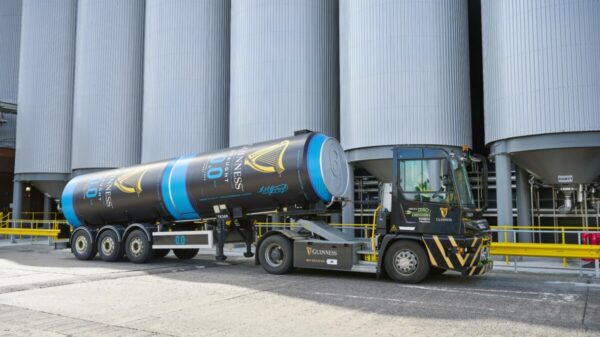The past 12 months have been something of a whirlwind for the sustainability and green business sector – from prime minister Rishi Sunak’s brazen policy U-turns to ongoing greenwashing controversies and the never-ending drama of big oil; it’s been a journey.
As businesses race against the clock to reach net zero, the turning of a new year brings them closer to key sustainability targets and deadlines – many of which would have been set some time ago. It’s a sobering thought to realise that all those 2030 goals are now just four short years away…
The clock is also ticking for businesses aiming to reach net zero by 2050 – and as the globe continues to get warmer, the pressure is on for key industry and policymakers.
The past year has certainly been a learning curve for Lego, which aims to reach net zero by 2050.
Earlier this year, the toymaker scrapped its plans to make bricks from recycled plastic bottles, arguing that while ‘green’ on the surface, the move would actually have produced more carbon emissions than it saved. Despite the setback, company’s chief executive Niels Christiansen said the toymaker is now aiming to make the bricks more sustainable by implementing bio-based and recycled materials.
There is a lot to reflect on as the year comes to the close. But for now, we’re asking business leaders the big question: what they expect to see from the sector in 2024.
The year of sustainability
Commenting on sustainability trends for 2024, British Retail Consortium (BRC) climate action roadmap manager Nicki Hunt said trends are likely to include using renewable energy to meet the demand of “more sustainably produced products”.
“Retailers continue to focus on the industry’s target of net zero by 2040, ten years ahead of the government,” said Hunt.
“Areas of specific focus include developing on and off-site renewable energy projects, movement to battery EV and biofuels for larger goods vehicles, and meeting demands of customers for more sustainably produced products.
“The BRC’s Climate Action Roadmap, together with partners, continues to help retailers in all these important areas.”
Last week, retailers partnered with NGOs and the BRC to launch a grocery products carbon reporting standard.
Hunt said the standard will allow to conduct “carbon footprinting at scale”, allowing them to “pinpoint where emissions are highest in their supply chains” and “make product development decisions as a result”.
Subscribe to Sustainability Beat for free
Sign up here to get the latest sustainability news sent straight to your inbox everyday
2024 is a ‘critical’ year for finance
As the transition for net zero remains a “key priority” for UK Finance and its members, head of sustainability policy Ian Bhullar said 2024 will be “another critical year”.
“At Cop28, we saw a global commitment to transitioning away from fossil fuels in energy systems, a tripling of renewable energy capacity, and ramping up energy efficiency improvements,” he added.
“We now hope to see this sustainability commitment backed up by clear, consistent policies at national and local level.”
Bhullar also outlined that the UK is “not guaranteed success in the ongoing race to attract international investment and deliver a world-leading green financial centre”.
“We hope policymakers use 2024 to set a clear direction of travel. This includes clear policies for decarbonising the UK’s housing stock and supporting SMEs in the transition – both of which are of great importance in addressing UK emissions.”
Reflecting on 2023, Bhullar nods to the International Sustainability Standards Board (ISSB) Standards that will help to “generate consistent disclosures and data to enable the transition”.
“We encourage the UK government – and partners around the world – to make 2024 the year they endorse and set the groundwork to implement these important standards,” he concluded.
Greater focus on global reporting standards
The sustainable business policy and insights team at the Association of Chartered Certified Accountants (ACCA), headed up by Sharon Machado, predicts 2024 will be a year where “global [reporting] standards can serve as a baseline”.
“Cultural and operational shifts by organisations to bring together different reporting requirements across different jurisdictions,” it added.
As businesses implement sustainability in other areas like finance, the ACCA stresses there will be a “growing demand” for talent in integrated business – for example, strategy setting and access to sustainable finance.
The accounting body expects to see “regional action” by businesses and legislators encouraging the “reduction in the use of fossil fuels” following Cop28, while elections are expected to emphasise a focus on transitioning in their manifestos and regulation.
It also warned that “some organisations may need to pay attention to whether they are genuinely focused on being sustainable or biased on amending activities and its reporting in order to comply with regulation.
“Simply being focused on compliance may not lead to the best sustainable business outcomes.”
ACCA also said it believes the business, finance and accountancy profession has a major role to play to mitigate this risk, adding that professionals will need to ensure they are suitably skilled in core sustainability areas.
A drive for DEI initiatives in 2024
Metta co-founder and director Gabi Matic predicts a “drive” for diversity, equity and inclusion programmes over the coming year as the climate crisis progresses.
“We increasingly need different perspectives and expertise to try and solve the problems that we are facing,” said Matic, who heads up the sustainable tech business.
“Having a more diverse and inclusive workforce is part of the solution, so I believe we will see a drive for more DEI initiatives in 2024 to ensure we have a broad perspective when tackling climate challenges.
“We must work harder to promote a culture of innovation, diversity and original thinking to avoid getting stuck in our old ways.”















